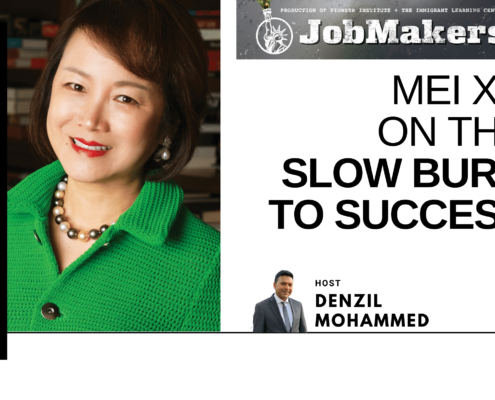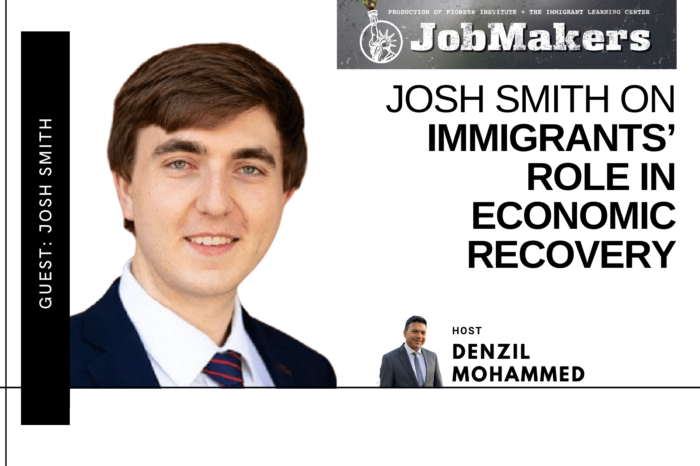Josh Smith on Immigrants’ Role in Economic Recovery
/in Economic Opportunity, Featured, JobMakers /by Editorial StaffThis week on JobMakers, host Denzil Mohammed talks with Josh Smith, research manager at The Center for Growth and Opportunity at Utah State University, about his work to demonstrate the outsized impact immigrants have on the economy and our culture. Josh describes some of the the negative narratives and the “othering” of immigrants, even though they’re part of our communities. Despite repeated fears that each new migrant group would never assimilate, America remains a “nation of immigrants,” and this is its not-so-secret sauce – as you’ll learn in this week’s JobMakers.
Guest:
 Josh Smith is a Research Manager for the Center for Growth and Opportunity at Utah State University. He researches immigration policy in the US and his writing has been published in several national outlets including Newsweek, The Hill, and Yahoo News. He graduated with a Master’s in Economics from Utah State University in 2018.
Josh Smith is a Research Manager for the Center for Growth and Opportunity at Utah State University. He researches immigration policy in the US and his writing has been published in several national outlets including Newsweek, The Hill, and Yahoo News. He graduated with a Master’s in Economics from Utah State University in 2018.
Get new episodes of JobMakers in your inbox!
Read a Transcript of This Episode
Please excuse typos.
Denzil Mohammed:
I’m Denzil Mohammed and welcome to Jobmakers.
Denzil Mohammed:
Immigrants have always benefited from and benefited the United States. The evidence is everywhere without immigrants. We wouldn’t have those Levi’s 5 0 1 S that called Budweiser or the ability for kids to learn during a pandemic with zoom immigrants can help fill the millions of vacancies today, the enriches with all their foods and cultures, and they take advantage of America’s entrepreneurial ecosystem to innovate and start the greatest companies. So why is it such a tough sell for Josh Smith research manager at the center for growth and opportunity at Utah state university? The negative narratives on immigration that we fed and the othering of immigrants, even though they’re part of a community is just like everyone else is easy to take hold. And it’s not a new story. In fact, it’s as American, as America, as the nation of immigrants, the work of Josh and others demonstrate not only the outsized impact immigrants have on our economy and our culture, but also the repeated fears that each new migrant group who would never assimilate, even though they did and that working together, America, new or old benefits, everyone it’s, America’s not so secret sauce, but we will all lose out.
Denzil Mohammed:
If we give into the fair and the othering, as you learn in this week’s job, maker’s podcast, Josh T Smith research manager at the center for growth and opportunity at Utah state university. Welcome to the job makers podcast. How are you?
Josh Smith:
I’m doing great. Denzil, thank you so much for having me.
Denzil Mohammed:
So tell us a little bit about your center and the work that you do.
Josh Smith:
Yeah. The center for growth and opportunity at Utah state university is a nonpartisan research center based at Utah state university. We work on a variety of variety of issues, mostly public policy, and how we can use research to solve those. My interest is an immigration policy. So I work on immigration and how we make that system work for the entire country.
Denzil Mohammed:
I see. So therefore what is your special interest in immigration? Why, why did you choose that? And is it really related to growth and opportunity?
Josh Smith:
I’ve always have felt an affinity for immigrants because my birth mother was 15 when I was born. And so I see immigration as the same sort of opportunity that I had because my birth mother chose to give me up for adoption. If she would’ve tried to raise me in a home where her parents said, if you keep this child, you, you can’t live under our roof and my opportunities would’ve been dramatically different. And so I see immigration through that sort of adoption lens. How do we get people into places where they can be successful? Give them the tools that they can actually be successful in whatever way they want to take their life. Immigration is exactly that. That’s all the research boils down to those simple points. If you give people the opportunity to grow, they’re going to do so people bring prosperity.
Denzil Mohammed:
So let’s bring it into the present. What role do immigrants play in the country’s recovery from the pandemic and our current sort of dire economic situation? So let’s start with immigrant business orders. I know that 9% of the Utah population is foreign born, but 11% of entrepreneurs are foreign born. So that’s a higher rate, which is something we see across the border across the, the country. What was it like for them pre pandemic and during the pandemic, and how did they impact our economy in your economy? Normal times,
Josh Smith:
Immigration here has been a big benefit. Like, like we talked about lots of entrepreneurs, lots of immigrant entrepreneurs have found out success in Utah. And before the pandemic, they were finding success during the pandemic. They faced all the same problems that everyone did. My father-in-law runs a chocolate factory. He had all sorts of problems, finding workers running the factory safely during the first stages of COVID and for immigrant entrepreneurs, immigrant business owners, it, you add on an additional level of difficulty where local governments can do a lot of good by trying to do outreach, providing the kinds of training, the kinds of information, a trusted information source, so that people know simple ways to, you know, run a meat packing factory cleanly and carefully during COVID in, in particular, those are the kinds of issues that here in Logan, there were a lot of problems with at first and local community members really stepped up. There was a great story in the Washington post about the local refugee center here working on just communicating to both immigrants and the refugees that they serve, how to deal with COVID, where to find medical care. And that’s something that I’m really excited to say Utah did well.
Denzil Mohammed:
And I’m just curious as the kinds of businesses that that immigrants tend to, to, to found in Utah, is it a lot of retail accommodations, things like that?
Josh Smith:
That’s right. It’s about the same as national trends, as far as I know the you know, we’re lucky, I’m really lucky to have the best Indian place in the entire world down, just down the street from Utah state’s campus here 10 to oven routinely, it’s, it’s in a gas station. So we love when people come out to visit taking them there, because it’s not exactly the kind of, you know, pompous looking very fancy kind of place it, but it has the best Indian food that I’ve had anywhere in the world. Without immigrants. We would have a lot of places that sell hamburgers and hot dogs, but maybe not the kind of a variety. So there’s a great Mexican place in town here, several because of the Hispanic immigration influence great French food, great Italian, all because immigrants come in and that’s part of why we say immigration brings prosperity, that people bring prosperity because of their differences. We all are better off sharing and discovering new ideas or new cuisines even.
Denzil Mohammed:
And it’s something Americans really take for granted that we have access to all these different kinds of cuisines. I mean, it has enriched our culture so tremendously not to mention our economy, right.
Josh Smith:
We have about 15% of the entire country is born born, but 25% of the country is <laugh> 25% of the countries. Entrepreneurs are foreign born immigrants.
Denzil Mohammed:
So that’s at the very local level. How exactly do these entrepreneurs help their communities and the country overall, especially in our recovery, from the pandemic
Josh Smith:
That’s right. Well, right now we’re recording this conversation over zoom. Zoom is famously started by Eric won and he was actually denied eight times before his ninth final try. He was admitted into the us to start his business. And you can think about a lot of entrepreneurs who might be facing the same kinds of questions. Like I wanted to come to the us, I’m trying to get in, but I just can’t find a way. And those kinds of stories are really troubling. If you want to have, you know, zoom employees be here in the us be businesses that grow the us pie, the us economic growth in pie. There’s a lot to be said for finding ways to expand the entire economy so that everyone is better off. And that’s the story. I mean, it’s not just recent with zoom and Eric one, you have Google, you have at, and T all have immigration connections in some sense.
Josh Smith:
And historically at, and T is one example, but Andrew Carnegie is of course, another famous example. And even though the town I grew up in had more cows than people, it also had a Carnegie public library, right? This is the library set up by Andrew Carnegie as one of the wealthiest mans to have ever lived. And that’s the kind of impact on both the economy and also two cultural sorts of conversations beyond just food. Those kinds of successes boil over from business sectors that are cold, you know, capitalist competitive sort of stories into much more human stories, where even in a world where I live in a tiny little town, I can sit on the steps of a library that an immigrant made possible.
Denzil Mohammed:
And you mentioned the founder of zoom. So this is not an Andrew Carnegie’s story is not an unfamiliar story that it continues to happen generation after generation, right?
Josh Smith:
That’s right. We have this, we have a fun story. America’s a nation of immigrants, but it’s also a nation of people who say, it’s not a nation of immigrants. One of our research papers here at the center by Paul Sharp and one and one coauthor shows that when great, when Danish people came to the us, they brought dairy techniques that no one else really had except the Danes. And that made the us dairy industry really strong, other than it would’ve been otherwise. But they also show that these great little quotes from that time period saying, well, we can let the Danes in because they won’t assimilate. And if you fast forward 2025 years, you see Danes used as the example of model immigrants, people who will obviously assimilate but those Hispanic immigrants are never going to assimilate. And Leah Busan and Ron Abra Minski have this great new book called streets of gold that details that history and gives a lot of should give you a lot of comfort. If you do worry that we’re going to lose something to immigration, we should take lots of comfort in the stories that actually we’ve always had. These fears and immigrants have always, always assimilated, always become American and always made the country a, a, a stronger and more prosperous place.
Denzil Mohammed:
Well said, Bravo, I, you all released a paper recently looking at immigrants, legalization and manufacturing. That’s right. Tell me a little bit about this paper.
Josh Smith:
Yeah. That’s a really exciting paper. What it basically shows at root is that providing some kind of legal pathway to citizenship makes the, the economy worked more productively. So in the case of manufacturing, you have the grant of legal health citizenship that was available because of the Reagan amnesty bill or the Reagan compromise. You had lots of people who suddenly had a pathway to legalization. And because of that, what we see is manufacturing got more productive. That’s really important in a world where we have high inflation, because if we want our store shelves to be full of low cost affordable goods, what we also need to be more productive. So manufacturing seeing that immigration has made manufacturing companies more successful is a really promising area for dealing with today’s problems. Maybe there’s ways to account for the same kinds of legalization issues that people face.
Josh Smith:
So the central story there is that if you are in the country and don’t have legal status, you may take positions that you’re not well suited for, or that there are better, you know, positions that would use your training and skills. And so legalization two other researchers in a new paper publish in labor economics, estimate that some kind of legal work option would increase the us GDP by about 202 billion a year, which boils down to about $600 additional in your pocket each year, which is great. If you think about the fiscal stimulus bills during COVID the COVID cash, those were about 1400, $1,200. So we’re talking about half of that, but just for free, because we’re getting people to do better at work faster.
Denzil Mohammed:
So you’re saying they were, they were still here as workers, they were working, but legalization, it gave them a one up, right.
Josh Smith:
That’s right. Legalization gave them a step up out of the shadows and into positions that they’re better suited for.
Denzil Mohammed:
I see. Okay. That, that makes a lot of sense to me. I’m such a boon to us. And as you said earlier, this is a really important point. We’re talking about immigrants, but this is really, it’s a story of the economy, society culture. It’s immigration feeds into everything in the United States. So working alongside immigrants is how we generate prosperity locally and beyond. That was a really, really great point. And of course we read a period now of, of serious inflation. Do you see a, a parallel there with immigrant workers and inflation and legalization?
Josh Smith:
I think it’s clear that inflation doesn’t have a silver bullet. There’s no one policy that’s gonna eliminate it. There’s tons of researchers who have proposals. And I think most of them have some amount of value, but that said, immigration’s gotta be a part of that conversation. And not just because people are sometimes only making the argument that we need more immigration because wages are rising. I think wages should definitely go up as people become more productive. So I’m hesitant to say, we should just have more immigration to reduce wages, but in particular, what we should do is find ways to bring back the workers who never came because of COVID. So Giovanni Perry and economists at the, at UC Davis estimated we have about 2 million missing workers in the economy, just because of the COVID immigration cuts. It’s a lot of workers, but overall that we have about 11 million job openings in the country and about six to 5 million people who are unemployed. So basically anyway, you cut it. We have about 5 million missing workers. Maybe we can bring in 2 million immigrants to make up that shortfall, but we’re still going to need lots of policies to make sure that we feed the us economy, what it needs to keep to stay productive.
Denzil Mohammed:
So we closed off during the pandemic and the result of that is Mo job openings, less job seekers and immigration is where we can really have, make a dent in that. So what do you say to those who are skeptic of your skeptical of your research on these positive impacts of immigrants and immigration? How would you frame that discussion? And, and what would you say?
Josh Smith:
I think that the people who are skeptical of immigration have often have good reasons. So you can think about maybe Tim Tim’s and high school dropout. He dropped out at 16 or 17 to work at a local plant because he thought $15 an hour was a lot of good money. Now, now he is 25 wants to start a family. Well, what options does Tim have? Does he just go get a G E D well, that solve his problems and open doors. I think critics and integration are entirely right on that point to think about, well, how are we helping the small portion of people who do lose from immigration? Because all of the statistical debates, you can read hundreds of E economic papers about how wages are affected by immigration. And they all boil down to a really simple finding that in the short run people, without a high school education seem to lose a small bit of wages for some time, some amount of time between five and seven years, that’s a long time to lose, you know, far four to 10% of your wages, depending on the estimate that you choose.
Josh Smith:
And so I think there’s lots of room for us as researchers to tackle that central question, how do we actually help someone like Tim who is losing out from immigration? But the good news is that Tim’s only make up about 10% of the us population. There’s only about 10%, one out of 10 people doesn’t have a high school degree. So the real real question is why would we make policy based on just those 10%? That’s why economists like Brian Kaplan and Giovanni Perry again, often advocate keyhole solutions. So let’s help those people out. But I do think we haven’t done a good job as researchers figuring out what those problems are. So I’m entirely on board with many of the critiques of immigration policy in the abstract. But at the same time, just this year, the department of labor gave out 145 million in grants for retraining and reskilling programs that were funded by H one B visa, application dollars. And I think opportunities like that to make the immigration system work for the entire country they’re prevalent throughout. They just are opportunities abound to find ways to make immigration work for everyone. And I think there’s a lot of good that we can do just in taking seriously, those sorts of concerns.
Denzil Mohammed:
It’s interesting and interesting. You bring up Tim because those anecdotal stories really have a powerful impact on people they get shared and spread widely, and it really has a, a huge impact on people so that when we come up with research that says something else, right? It, that, that it does not register at all. So you mentioned a book earlier called streets of gold it’s streets of gold America’s untold story of immigrant success. I’m, I’m actually hoping to get the authors of this book on this podcast. But what is, what, what impression were you left with from this book?
Josh Smith:
I think everyone ought to run out and buy streets of gold. I, I don’t get any kind of kickbacks or anything. I’m not connected to the authors, but Leah Bustan and Ron, a Minsky are two economic historians. Who’ve been writing about immigration for years. And
Denzil Mohammed:
Ron, by the way, is an immigrant from Israel, right?
Josh Smith:
That’s right. And one of the stories that they tell in the book is, is about that story. So for context, streets of gold is about that age old context between America as a nation of immigrants and America, as a nation of people who want to build walls and put up, keep out signs. It’s about the kinds of cultural contests and economic worries that have been the story of immigration throughout history and Ron’s story. He talks about their research project, which is looking at millions of genealogical records and seeing what happens to someone once they arrive here in the us, and you can trace people through time. And in particular, you can cha you can sort of see what happens to their thinking about America. You can see what happens to their thinking about their identity. So for example, Ron, Ron’s an immigrant from Israel. He lands in the us, he, I think he gets married here in, in the us, but maybe he comes married, but their first son, they named Roe, which is a Hebrew word for shepherd.
Josh Smith:
And he tells the story in the book in streets of gold saying, well, actually like we, we sty meet all the babysitters, all the teachers, no one knew how to say it, but for their next child or their third child, I think they name him, Tom, which is still got a Hebrew sort of connection, but is much more Americanized and what they find in their research, Leah and Ron is that that’s a common story immigrants. When they, when they come to the us, they start off with very traditional immigrant sorts of behaviors. But as it time goes on, they Americanize quite quickly. And that shows up primarily as a change in both their names. So changing something like Trump to Trump as a famous example, but also in changing the names that they give to their children. And I think that reflects a sort of interest and desire to fit in and a fundamental reflection of immigration’s importance to the immigrants in the us.
Josh Smith:
It’s a story about helping their children become American, become successful and obtain the, the American dream. So streets of gold is a beautiful book, wonderfully written, quite accessible for a book that’s about mil analyzing millions of genealogical records, but in a time where people are thinking or discussing cutting off immigration, even more than we already have, it’s important to keep their historical perspective in mind. What they show is really we’ve had these kinds of debates that immigrants don’t assimilate. We had it in 1882 just before we passed the Chinese exclusion act. We had it just recently with the proposal to ban immigrants from Muslim countries. We had it all throughout. COVID the implication that immigrants are carrying diseases has a great reflection in one of the stories they tell in streets of gold, where representative in Congress says we can’t let in Chinese immigrants because they all have smallpox.
Josh Smith:
And that kind of story is quite common, but all of their research findings are so, so optimistic. They find that people learn English quite quickly, both in the past. And today they find that people Americanize not just in measures of children, but in the types of behaviors that they have people economically assimilate as well. So people come here and their children quickly climb up the income ladder, and those are beautiful stories of the American dream. And Leah and Ron did this great job of making the case from just the simple findings of their economic research project saying we don’t have reason to fear that people will lose out in jobs. We don’t have reason to fear people will lose wages, but we do. And we have lots of reasons to think that bringing immigrants to the us strengthens and promotes the us culture instead of denigrating,
Denzil Mohammed:
We’ve always been fed by immigrants and we are the greatest economy in the world. Maybe one has to do with the other, these hungry immigrants.
Josh Smith:
That’s right. But I think, I think it’s impossible to view America’s history without thinking about how immigration has really seeded the success of the future success. So there’s a great research paper called the titles immigrants and the making of America, where they analyze historical rates of immigration to at the county level. And so they can look at how many counties got, how much county got in immigration, and then they can look at the future outcomes. And what they find is that immigration high immigration in the past predicts future success and all sorts of measures, both increased income on a per capita level, lower poverty rates higher education. People are just wealthier and better off because of immigration. You see that in, in that’s might be happening because people are moving into successful areas, but it’s also because immigrants bring new ideas. So Eric won made us all better off by coming here, inventing zoom and allowing us to have these conversations, whether happens, you know, after the pandemic or in the middle of the pandemic. I can’t imagine not having seen many of my friends for months during COVID, but you know, we watched movies over zoom together. We played video games. We played board games all possible because of an immigrants invention brought here to the us. And that’s really the story we’ve always had. In economic research, it boils down to the simple phrase. People bring prosperity,
Denzil Mohammed:
People bring prosperity. Josh Smith research manager at the center for growth and opportunity at Utah state university. Thank you for joining us in this podcast.
Josh Smith:
Hey, thank you, Denzil. Happy to come. Anytime
Denzil Mohammed:
Jobmakers is a weekly podcast about immigrant entrepreneurship and the contribution produced by Pioneer Institute, a think tank in Boston and at the Immigrant Learning Center in Malden, Massachusetts, a not-for-profit that gives immigrants a voice. Thanks for joining us for this. Week’s engaging conversation on the positive impact of immigration from the us. If you know an outstanding immigrant business owner or innovator or researcher that we should talk to email Denzel that’s D E N Z I L@job makerspodcast.org. I’m Denzil Mohammed Tune in next Thursday at noon for another Jobmakers.
Recent Episodes:
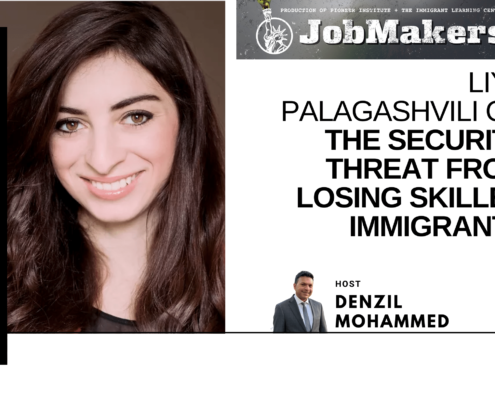
Liya Palagashvili on the Security Threat from Losing Skilled Immigrants
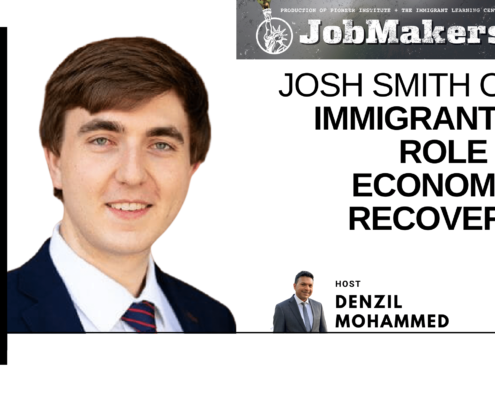
Josh Smith on Immigrants’ Role in Economic Recovery
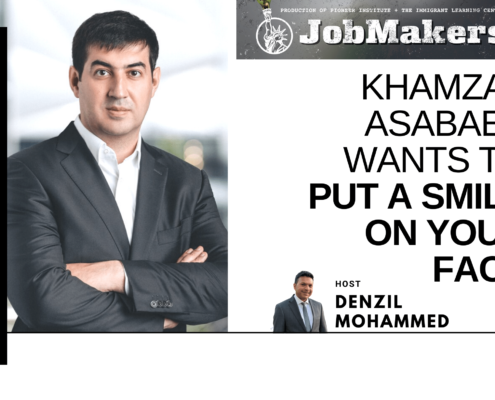
Khamzat Asabaev Wants to Put a Smile on Your Face

April Ryan Paints Her Way to Success
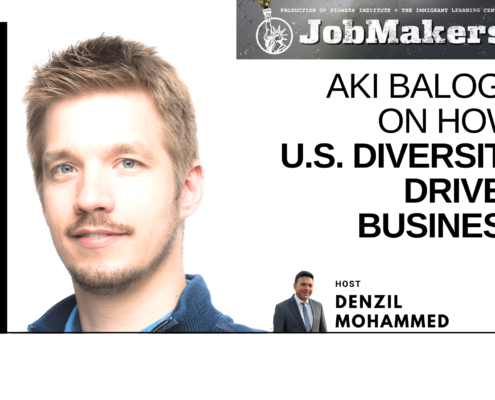
Aki Balogh on How U.S. Diversity Drives Business
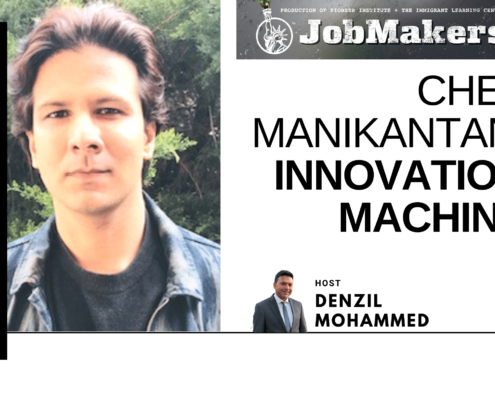
Chet Manikantan: Innovation Machine
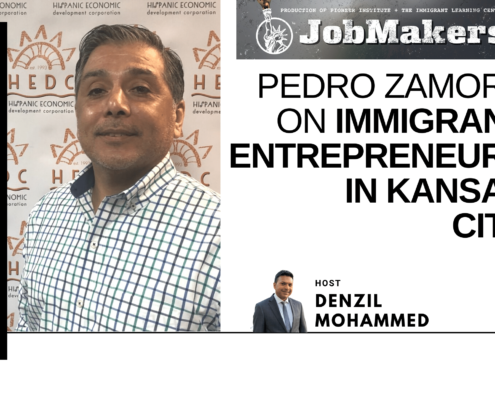
Pedro Zamora on Immigrant Entrepreneurs in Kansas City
